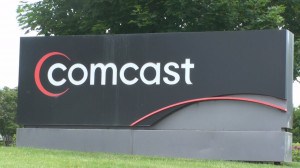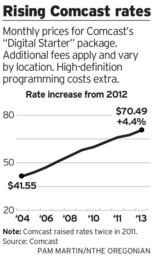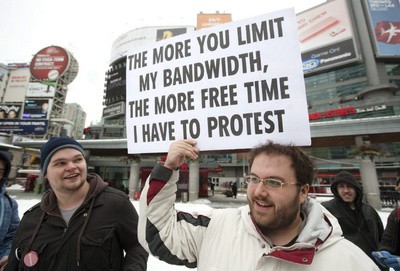
Verizon FiOS is coming to Fire Island.
Verizon Communications has thrown in the beach towel attempting to convince residents of popular tourist destination Fire Island to accept its wireless landline replacement Voice Link as the company’s sole landline service option.
After telling customers for months it did not make financial sense to restore copper service or bring its fiber optic network FiOS to Fire Island, Verizon senior vice president of national operations support Tom Maguire today reversed course.
“In today’s competitive marketplace it’s all about making sure you can take care of customers because if you don’t they can go someplace else,” Maguire told Newsday. “Interestingly on Fire Island, there is no place else, so we listened to our customers. It was pretty apparent that we wanted to do something beyond Voice Link and the wireless network, so we think that fiber is the best course.”
Verizon customers on Fire Island have told Stop the Cap! all summer they felt abandoned by Verizon, stuck using a wireless landline replacement service they claimed worked poorly or not at all at times. Customers also loudly complained that Verizon was effectively forcing broadband customers who depended on Verizon DSL to the much more expensive Verizon Wireless broadband service with a very small usage cap. Many attended meetings sponsored by elected officials or the Public Service Commission to decry Voice Link and demand Verizon offer the same quality service its landline network used to provide.
Maguire told the newspaper the company will now deploy its fiber network FiOS on Fire Island, offering residents new options for telephone and broadband service. The 600 customers on Fire Island with Voice Link will be able to keep the wireless service or switch to FiOS fiber.
Reached for comment, Verizon tells Stop the Cap! its fiber service will not include FiOS TV because Verizon does not have franchise agreements with the many municipalities on Fire Island, and their primary concern is getting the fiber network engineered and constructed.

Schumer
Fire Island residents have made it clear to Verizon their biggest concern is Internet access, not television, and Verizon FiOS will be able to deliver faster Internet speeds unavailable from DSL.
Verizon expects to begin construction in October, although it has already started preliminary design work for the new fiber network. Verizon expects to have the fiber build complete by the beginning of the 2014 summer season on the island.
Sen. Charles Schumer (D-N.Y.), who has been carefully monitoring the Voice Link issue, released a statement welcoming Verizon’s decision.
“By installing fiber-optic cables on the island, Verizon will not only make the system as good as it was before, it will be making it better,” said Schumer. “Fire Island residents will now have greater access to high-speed Internet – a necessity in the modern age – and reliable voice service. Verizon deserves credit for listening to our concerns and changing course.”
In a June guest article written for publication on Stop the Cap!, Maguire wrote it would cost Verizon from $4.8 million to more than $6 million to restore landline service. Maguire argued it made no economic sense to commit to a multimillion dollar investment with no guarantee that residents of the island will sign up for Verizon service.
“That’s probably why Verizon is the sole provider on the island,” Maguire noted in the piece. “None of the companies we compete with in other parts of New York offer services on the island.”
Today’s decision represents a complete reversal of the company’s earlier views, but one that is welcomed nonetheless by residents on Fire Island reached by Stop the Cap! this afternoon.
“We’re very glad this is now over and behind us,” said Verizon customer Shari who has toughed out the summer with cellphone-only service.
“I can’t wait to return Voice Link, which has been a real pain,” said Thom.
Both customers tell Stop the Cap! they intend to sign up for Verizon FiOS the moment it becomes available.


 Subscribe
Subscribe Comcast rates are going up again this fall in the Pacific Northwest, now exceeding $70 a month.
Comcast rates are going up again this fall in the Pacific Northwest, now exceeding $70 a month.
 the worst-rated cable operator in the United States, claims it needs usage caps and consumption billing to force heavy users to pay for needed upgrades. But that isn’t what Mediacom’s executives are telling investors and the Securities and Exchange Commission (SEC).
the worst-rated cable operator in the United States, claims it needs usage caps and consumption billing to force heavy users to pay for needed upgrades. But that isn’t what Mediacom’s executives are telling investors and the Securities and Exchange Commission (SEC). “
“
 Other customers incensed about the new usage limits have called to cancel service only to be threatened with steep early termination fees.
Other customers incensed about the new usage limits have called to cancel service only to be threatened with steep early termination fees. Waiting for Comcast and Verizon to offer cutting edge broadband to 620,000 Baltimore city residents and businesses appears to be going nowhere, so the city is hiring an Internet consultant to consider whether to sell access to its existing fiber network.
Waiting for Comcast and Verizon to offer cutting edge broadband to 620,000 Baltimore city residents and businesses appears to be going nowhere, so the city is hiring an Internet consultant to consider whether to sell access to its existing fiber network. Like many cities, Baltimore already owns and operates its own fiber ring, built with public funds to support the city’s public safety radio system. Like many municipal institutional fiber networks, Baltimore’s fiber ring is underutilized. Public safety and other institutional users often use just a fraction of available capacity. Despite the fact such networks are often oversized, they are rarely controversial because they do not typically compete with commercial providers and are usually off-limits to the public.
Like many cities, Baltimore already owns and operates its own fiber ring, built with public funds to support the city’s public safety radio system. Like many municipal institutional fiber networks, Baltimore’s fiber ring is underutilized. Public safety and other institutional users often use just a fraction of available capacity. Despite the fact such networks are often oversized, they are rarely controversial because they do not typically compete with commercial providers and are usually off-limits to the public.



